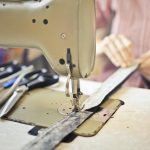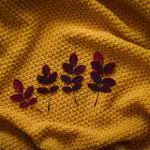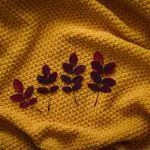If you're working with heavy fabrics like denim or canvas, a heavy-duty industrial sewing machine will be your best choice. It provides the power and durability needed to handle these materials with ease.
Each type of fabric has its own unique characteristics, and finding the right industrial sewing machine to match those characteristics is crucial for achieving professional results.
By understanding the specific features and capabilities of different industrial sewing machines, you can make an informed decision on which one is best suited for the fabrics you work with.
Key Takeaways
- Heavy-duty industrial sewing machines are the best choice for working with heavy fabrics like denim or canvas due to their power and durability.
- Overlock machines are ideal for working with knits as they offer stitch flexibility and control over thread tension for a neat and secure finish.
- Overlock machines deliver durable and flexible stitches, preventing unraveling of knit fabrics, and have differential feed mechanisms to prevent stretching or puckering.
- Precise thread tension control and differential feed adjustment are crucial for optimal stitch quality, and it is important to use the correct sewing machine needles and understand fabric characteristics for best results.
Heavy-Duty Industrial Sewing Machines
When choosing a heavy-duty industrial sewing machine for fabric work, you should look for a model with a robust motor and durable construction. Fabric thickness is a critical factor to consider. A heavy-duty machine is designed to handle thick fabrics like denim, canvas, or upholstery materials without struggling, ensuring smooth and consistent stitching.
Additionally, speed and efficiency are essential for industrial sewing. Look for a machine with adjustable speed settings to accommodate different fabric types and sewing techniques. High-speed stitching capability ensures quick completion of projects, increasing productivity.
In heavy-duty industrial sewing machines, a powerful motor is key to handling thick fabrics. The motor should provide enough torque to penetrate and stitch through multiple layers of fabric without stalling or overheating. Durability is also crucial, as heavy use can take a toll on the machine. Look for a solidly built machine with a sturdy frame and components that can withstand the demands of industrial sewing.
Overlock Machines for Knits
When working with knits, you'll want an overlock machine that offers stitch flexibility to accommodate the stretch of the fabric.
It's important to have control over thread tension to ensure a neat and secure finish.
Additionally, a differential feed adjustment feature can help prevent stretching or puckering of knits as you sew.
Stitch Flexibility for Knits
You'll find that overlock machines are ideal for working with knits due to their stitch flexibility and ability to prevent unraveling. Knit fabrics require stitch types that can accommodate their inherent fabric flexibility, and overlock machines are designed to deliver just that.
When sewing knit fabrics, stitch quality is crucial, and overlock machines excel in producing strong, stretchable, and neat stitches. These machines are equipped with differential feed mechanisms that prevent stretching or puckering of knit fabrics during sewing, ensuring a professional finish.
Additionally, overlock machines offer various stitch options such as overedge, coverstitch, and flatlock, providing versatility for different knit fabric sewing requirements.
With their ability to create durable and flexible stitches, overlock machines are the top choice for achieving high-quality results when working with knits.
Thread Tension Control
For achieving optimal stitch quality when working with knit fabrics using overlock machines, ensure precise thread tension control. Improper tension can cause issues like loose or tight stitches, thread breakage, and fabric puckering.
To troubleshoot tension problems, start by checking the bobbin tension. If the bobbin thread is too loose or too tight, it can affect the overall stitch quality.
Additionally, be mindful of using the correct sewing machine needles for knits. Ballpoint needles are suitable for knit fabrics, as they have a rounded tip that slips between the fabric threads without damaging them. Using the appropriate needle size is also crucial; smaller sizes work well for lightweight knits, while larger sizes are better for heavier knits.
Mastering thread tension control and needle selection is fundamental for achieving professional-looking overlock stitches on knit fabrics.
Differential Feed Adjustment
Achieving balanced feed when working with knit fabrics using overlock machines requires adjusting the differential feed. This adjustment controls the speed of the front and rear feed dogs, preventing stretching or gathering of the fabric. To master this technique, follow these tips:
- Understand the fabric: Different knits may require different settings for the best results.
- Experiment with settings: Test different combinations of the front and rear feed dog adjustments to find the optimal setting for the specific fabric being used.
- Practice fabric handling: Maintain a consistent speed and gentle guidance to prevent distortion.
- Pay attention to seam puckering: Adjust the feed dogs to reduce or eliminate puckering in the seams.
- Learn sewing techniques: Master techniques like stretching or easing in the fabric to achieve professional-looking results.
Straight Stitch Sewing Machines
When it comes to straight stitch sewing machines, you'll want to consider their best fabric applications, durability, and performance.
Understanding the specific fabrics that a machine excels with can help you make the best choice for your sewing needs.
Additionally, durability and performance are crucial factors to evaluate in order to ensure that your machine can handle heavy usage and deliver high-quality results.
Best Fabric Applications
When choosing an industrial sewing machine for fabrics, consider the straight stitch sewing machine for its versatility and precise stitching capabilities. This type of machine is ideal for various fabric applications due to its ability to handle different fabric types and stitch lengths effectively.
Here are some fabric applications where the straight stitch sewing machine excels:
- Lightweight fabrics such as silk and chiffon
- Medium-weight fabrics like cotton and linen
- Heavyweight fabrics including denim and canvas
- Delicate fabrics such as lace and tulle
- Elastic fabrics like spandex and jersey
With the straight stitch sewing machine, you can easily adjust the stitch length to suit the specific fabric you're working with, ensuring neat and professional results for your sewing projects.
Durability and Performance
For ensuring optimal durability and performance in your sewing projects, rely on a straight stitch sewing machine. These machines are well-suited for working with a wide range of fabric types, from delicate silks to heavy denims, ensuring that they can meet your diverse sewing needs.
Their straight stitch design provides excellent stitch quality and precision, enhancing the overall performance of your sewing projects.
When it comes to durability, straight stitch sewing machines are built to withstand the demands of heavy-duty sewing, making them reliable for long-term use. Additionally, they often have lower maintenance requirements compared to more complex machines, allowing you to focus more on your sewing and less on machine upkeep.
Zigzag Stitch Sewing Machines
You can consider a zigzag stitch sewing machine for versatility in handling different fabric types and sewing techniques. Zigzag stitch machines offer various benefits that make them suitable for a wide range of sewing projects.
Here are some key features to consider when evaluating a zigzag stitch sewing machine:
- Stitch Width: The ability to adjust the stitch width allows you to create different decorative effects and reinforces the edges of stretch fabrics, preventing fraying.
- Fabric Compatibility: Zigzag stitch machines can accommodate a variety of fabrics, including knits, stretchy materials, and woven fabrics, making them versatile for different sewing needs.
- Built-in Stitch Patterns: Look for machines that offer a variety of built-in stitch patterns to expand your creative options and adapt to different sewing tasks.
- Adjustable Needle Positions: Machines with adjustable needle positions provide more precise control over stitching, especially when working on intricate designs or embellishments.
- Dual Feed Mechanism: Some models come with a dual feed mechanism to ensure smooth and even fabric feeding, which is beneficial when working with challenging or thick fabrics.
When choosing a zigzag stitch sewing machine, consider these features to find the best match for your sewing requirements.
Walking Foot Sewing Machines
If you are seeking a sewing machine that offers enhanced control over challenging fabrics and precise stitching, a walking foot sewing machine is an excellent choice. This type of sewing machine is equipped with a walking foot mechanism that allows the top, bottom, and sometimes even the needle feed to move together, preventing layers of fabric from shifting. This makes it particularly effective for quilting and working with thick or slippery materials. Additionally, walking foot sewing machines typically accommodate larger needle sizes, making them suitable for heavy-duty fabrics.
When considering a walking foot sewing machine, it's important to evaluate its speed control capabilities and the options available for the presser foot. Variable speed control allows for greater flexibility when working with different fabrics and projects. The presser foot options, such as the ability to adjust the pressure or use different types of presser feet, can further enhance the machine's versatility.
Here's a comparison table to help you understand the key features of walking foot sewing machines:
| Features | Walking Foot Sewing Machines |
|---|---|
| Quilting Capabilities | Excellent |
| Needle Size | Accommodates larger sizes |
| Speed Control | Variable speed settings |
| Presser Foot Options | Adjustable pressure and various foot options |
Leather and Upholstery Sewing Machines
When considering an industrial sewing machine for fabrics, the walking foot sewing machine's capabilities seamlessly transition to handling leather and upholstery materials with precision and control. The walking foot mechanism, which moves the fabric, leather, and padding layers together, ensures even stitching and prevents slippage, making it ideal for leather sewing techniques and upholstery stitching methods.
- Walking Foot Design: The walking foot evenly feeds multiple layers of fabric and prevents shifting, crucial for leather and upholstery work.
- Heavy-Duty Construction: Industrial sewing machines designed for leather and upholstery feature robust construction to handle thick materials and demanding stitching.
- Adjustable Presser Foot: The ability to adjust the presser foot pressure is essential for working with different leather weights and upholstery materials.
- Large Bobbin Capacity: A larger bobbin allows for longer sewing times without frequent bobbin changes, a convenience when working on leather and upholstery projects.
- Specialized Needles and Threads: Industrial sewing machines for leather and upholstery often require specific needle and thread types to ensure high-quality stitching results.
Multi-Needle Embroidery Machines
The multi-needle embroidery machine's versatility expands the range of applications for leather and upholstery work, providing intricate design options with efficiency and precision.
Multi-needle embroidery machines offer exceptional embroidery design compatibility, making them ideal for creating intricate patterns on fabrics.
These machines are equipped with multiple needles, allowing for the simultaneous stitching of different colors and thread types, resulting in a faster and more efficient embroidery process. This feature is particularly advantageous when working on large embroidery designs or fulfilling bulk orders, as it significantly reduces production time.
Moreover, multi-needle embroidery machines are designed to achieve high-speed embroidery while maintaining accuracy and consistency, ensuring that intricate designs are executed flawlessly.
The speed and efficiency of multi-needle embroidery machines make them indispensable for businesses and professional embroiderers who seek to optimize their production processes without compromising on the quality of their work.
Whether you're working on upholstery, leather goods, or other fabric applications, the multi-needle embroidery machine's capabilities can elevate your embroidery projects to new heights of sophistication and craftsmanship.
Frequently Asked Questions
Can Industrial Sewing Machines Be Used for Delicate Fabrics Like Silk and Chiffon?
Yes, industrial sewing machines can handle delicate fabrics like silk and chiffon. They offer precise control and can handle delicate materials with ease. Just make sure to use the appropriate needle and thread for best results.
Are There Any Industrial Sewing Machines Specifically Designed for Quilting and Patchwork?
For quilting and patchwork, industrial sewing machines designed specifically for these tasks are available. They offer features like larger worktables, extended throat space, and specialized presser feet, making them ideal for these intricate projects.
What Type of Industrial Sewing Machine Is Best for Sewing Denim and Heavy-Duty Fabrics?
When sewing denim or heavy-duty fabrics with an industrial machine, ensure to select a model designed for heavy materials. Pair it with a sturdy needle suitable for heavy fabrics to achieve optimal results.
Can Industrial Sewing Machines Handle Stretch Fabrics Like Spandex and Lycra?
Yes, industrial sewing machines can handle stretch fabrics like spandex and lycra. They offer excellent sewing performance and are compatible with a variety of fabrics, including stretch materials, making them versatile for different sewing projects.
Are There Any Industrial Sewing Machines Suitable for Sewing Thick Layers of Fabric for Upholstery and Leatherwork?
Yes, there are industrial sewing machines suitable for sewing thick layers of fabric for upholstery and leatherwork. These machines are designed for heavy duty fabrics and can also handle delicate fabrics, stretch fabrics, quilting, and patchwork.
- Chemistry's Role in Fabric Production - July 25, 2024
- Moisture Management in Modern Fabrics - July 25, 2024
- Engineering Fabrics for Optimal Performance - July 25, 2024






